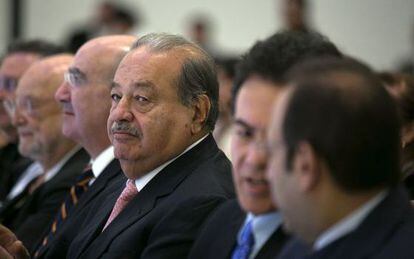Business magnate Carlos Slim to break up his Mexican empire after state pressure
América Móvil to sell off shares to stop being “a dominant player in the economy”


Business magnate Carlos Slim took a sharp change of direction on Tuesday when he announced that he would be breaking up his empire in Mexico, his native country and the home base of his business operations. Under pressure from President Enrique Peña Nieto, Slim has agreed to reduce América Móvil’s market share to below 50 percent. The administration’s economic reforms are seeking to do away with dominant players in the telecommunications market.
Slim will sell off almost 30 percent of the company’s assets – an amount worth around $20 billion, or 1.3 percent of Mexico’s gross domestic product. The goal is to rid himself of the restrictive label of “dominant player” and be able to operate freely again on Mexican soil. Although América Móvil serves 292 million cellphone clients in 26 countries, Mexico still represents 35 percent of its sales.
The firm announced its decision in a bitter statement that has inspired much speculation about the potential buyer, which many analysts say could be a foreign company. There are also questions about what Slim will do with the assets he obtains from the sale. Pay TV seems to be one of the possible recipients of his new investments. This industry had, until now, been off-limits to the telecommunications giant.
The regulations affect all firms holding a more than 50-percent market share in audience, traffic, users or subscribers
The label “dominant player” was the catalyst that provoked this war of titans. Telecommunications regulations are a cornerstone of Peña Nieto’s economic reforms and affect all companies holding more than a 50-percent market share in audience, traffic, users or subscribers in radio or TV. The independent Federal Telecommunications Institute (IFT) has drawn up a series of limits for these companies in the hope of correcting the distortion they have created in the free market. América Móvil, which owns 80 percent of landlines (Telmex) and serves 70 percent of the country’s cellphone subscribers (Telcel), has served as the model case for these regulatory measures. The government has limited the company’s freedom to impose certain fees, delayed its entry into the pay-TV sector, and ordered it to share its infrastructure with competing operators.
These measures, especially the last one, angered the telecommunications giant. In a rare confrontation of the sort rarely seen in Mexico, América Móvil – owned by one of the richest men on the planet, who has immense influence in his native country – accused the new legislation of being “confiscatory, excessive and unconstitutional.”
“It’s surprising that they are trying to legally force a company to invest only to then force it to give its services to competitors at no cost. Moreover, this confiscatory proposal rewards our competitors’ chronic lack of investment at the expense of customers,” the company said.
The shake-up did not upset Peña Nieto, who has bet a large part of his political capital on these reforms and his promise to set the monopolist practices right. He and the Institutional Revolutionary Party (PRI) received ample support from the right-wing National Action Party (PAN) during negotiations over the bill. Still, some influential senators from the Party of the Democratic Revolution (PRD) warned that the law would be much more damaging to Slim than to Televisa, the “dominant player” in radio.
Yet, despite these criticisms, the proposal did not lose any steam. Last Saturday, the Senate passed the bill by a vote of 80-37. And just yesterday, when Slim announced his company’s divestiture, the measure was going through its last round of negotiations in the Chamber of Deputies.
“There is a moral to this story,” says Luis Miguel González, editor of El Economista newspaper. “The law will not be the most influential factor in the reforms. It will be the businessmen. That’s where the real game will be played out.”
When the government lifts its restrictions, América Móvil
will be allowed to enter
the TV business on equal terms
América Móvil’s decision to divest itself of assets and return to less than 50-percent market share after nearly a quarter century of growth has sparked speculation, especially about the eventual buyer. The company gave out a clue in its statement: “The board of directors has decided to dismantle and sell some of its shares to favor a new operator independent of América Móvil, strong, with experience in telecommunications and with high economic and technical capacity, that will genuinely be able to participate in this capital-intensive sector to overcome the obstacle posed by our competitors’ insufficient investment in Mexico.”
Analysts say this strong operator must be a foreign firm with the capacity to assume the gigantic price of the shares and strong investments required. “It’s an almost $20-billion operation,” says Enrique Quintana, editorial director of El Financiero. “It would be difficult for a Mexican company to take that on.”
The operation may also involve other variables. According to sources close to the company, América Móvil has been studying the landscape and its divestiture could come from dismantling parts of the business or just services in less attractive regions or in those that require investment.
The company asked for two conditions in order to move forward with the transaction: that its shares sell at market value and that the burden placed upon Telmex and Telcel for being “dominant players” be removed so that they may once again operate with absolute freedom and thus prosper.
The destiny of the company’s new liquid assets is another unknown factor. When the government lifts its restrictions, América Móvil – which has always shown an interest in the small screen – will be allowed to enter the TV business on equal terms. The firm is especially interested in pay TV and the future of that industry lies in the so-called triple play offer – telephone, internet and TV. The other investments will be made outside of Mexico, in Spain or in other places in Latin America. “The telecommunications market moves $45 billion and radio moves $5 billion,” González says. “Obviously, he’s not just going to invest in television.”
América Móvil also said that it was prepared to give up its cellphone towers and its buy-in option in the satellite-TV provider, Dish Mexico – a possible move that had the IFT on alert.
Translation: Dyane Jean François










































